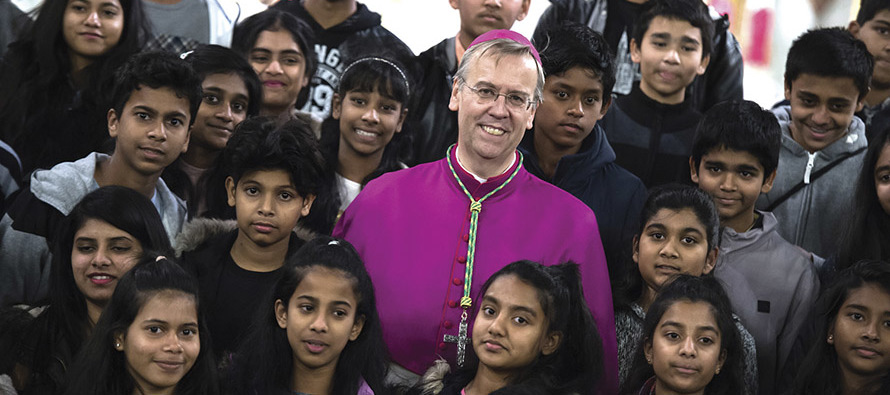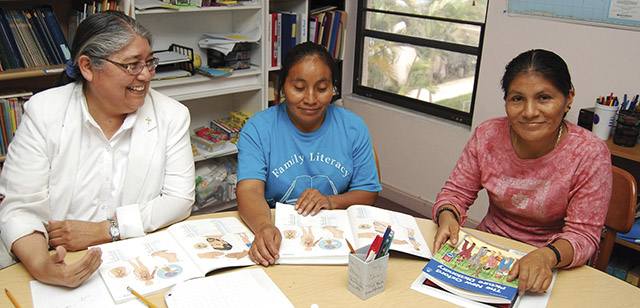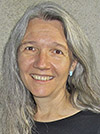Roll out the welcome mat

The Catholic Church in the United Kingdom, much like the church in the United States, is made up of immigrants from around the world. Pictured here is Bishop Nicholas Hudson at a Way of Mercy World Youth Day celebration in Westminster Cathedral, London. (Photo: Mazur/Catholic Church of England & Wales)
Something extraordinary happened at Standing Rock, North Dakota in December 2015. Defending their water supply and burial grounds made vulnerable by the Dakota Access Pipeline, the Sioux began a protest blocking the construction. That’s not the remarkable part. What is unusual is that more than 2,000 U.S. military veterans joined in to defend them against violence by U.S. law enforcement. Some veterans knelt before Standing Rock leaders in a reconciliation ritual, asking forgiveness for crimes committed against native peoples by the U.S. government throughout history. “We took your land” was among the sobering injustices the veteran spokesperson confessed.
“We do not own the land,” the Sioux leaders corrected gently in accepting the apology. “The land owns us. We are its caretakers.”
The mutual display of humility was stunning. It stands in stark contrast to the way most of us think about national identity. Despite the global citizenship we benefit from every day, we tend to stuff our allegiance tightly inside national boundaries drawn on maps. U.S. citizens claim a particular ownership of all that exists “from sea to shining sea.” We possess this land in proud terms that, without much reflection, can slide easily from patriotism to arrogance to aggression. This sense of possession toward land—and even culture—makes the arrival of the stranger in our midst a source of tension, which may turn to suspicion, hostility, even violence.
Scripture is clear-cut about how to treat the stranger: “You shall not oppress an alien; you well know how it feels to be an alien, since you were once aliens yourselves in the land of Egypt” (Exod. 23:9). It’s as clear as a U.S. vet kneeling in front of a Native American elder confessing white culture’s long legacy of trespass against the land’s citizens. It’s as clear as U.S. bishops reminding us that today’s immigrants “call most of us back to our ancestral heritage as descendants of immigrants and to our baptismal heritage as members of the body of Christ” (Welcoming the Stranger Among Us, 2000). All of us share in the world’s goodness because of God’s generosity—not because we’ve got the right documentation or because we were here first. To claim rights for ourselves, while denying the dignity of others, is to forget who we are.
For Catholics this message of welcoming the stranger comes alive every time a household embraces an immigrant family in the neighborhood, whenever an individual supports policies that aid refugees, whenever a parish makes it clear that the “strangers” among them belong.
Our heritage of “other”
Just a generation beyond their enslavement, Moses warned the Israelites not to forget their history as they moved into a better future in Canaan: “For the Lord, your God . . . executes justice for the orphan and the widow, and befriends the alien, feeding and clothing him. So you too must befriend the alien” (Deut. 10:17-19). The friends of God are recognizable by how they demonstrate hospitality to the most powerless.
• The dignity of the person
• Economic justice
• The common good
• The preferential option for the poor
• Rights balanced with responsibilities
• The promotion of peace
• Global solidarity and development
• The moral function of governments
Jesus reaffirms the gravity of such hospitality in his teaching about final judgment: “For I was hungry and you gave me food, I was thirsty and you gave me drink, a stranger and you welcomed me” (Matt. 25:35). If we fail to recognize Jesus in the needy stranger, we’re not excused. In fact, such recognition is the criteria for admission to the Kingdom.
In Welcoming the Stranger, the U.S. bishops reject the “anti-immigrant stance that has become popular in different parts of our country, and the nativism, ethnocentricity, and racism that continue to reassert themselves in our communities.”
These teachings are clear. Our natural egoism makes us cry “mine, mine” about everything we get our hands on from the time we’re toddlers. But there’s no room for self-centeredness in Christianity, including the spirit of nativism. Nativism describes the inner conviction that “we’re the real Americans”—and everyone who got here after us doesn’t belong.
Unity in plurality isn’t easy. Yet cultural pluralism is our story. During the last big century of mass migration from 1820 to 1920, the United States was saturated by waves of immigrants seeking a new home. The church responded energetically with ethnic parishes, schools, and charitable institutions, founded by men and women religious, hastening the integration of newcomers into the American story. That’s how my grandparents got here. It’s why I’m a participant in the American dream today.
It must be admitted: The institutional church was less responsive to Native American and black communities in our midst who sought the same integration. “The stranger you know” can be harder to embrace than the foreigner you don’t. Church leaders drafted statements of intent for these groups but rarely implemented them. Progress came mostly through the courage of individuals such as Augustus Tolton, the first black priest in the United States, and groundbreaking women religious, such as Elizabeth Lange, Henriette de Lille, Katharine Drexel, and Thea Bowman, who fought for the rights of Native American and black Catholics within the U.S. church.
Challenges of change
The face in need of our welcome keeps changing. Nineteenth-century immigrant waves came from Europe. The arrival of more non-European immigrants since 1965 has led to an ironic rise in hostility from citizens descended from the European influx. Unhappily, this is true in my family. We’re two generations “off the boat” ourselves, but my older relatives are deeply suspicious of the new arrivals.
This anxiety is especially strong in working-class communities already hard hit by shifts in the economy away from what used to be secure industries. Competition for work is keen in these regions. What will happen when a new wave of hungry laborers arrive on the scene?
Another factor affecting the new immigration was the tightening of borders between the United States and Mexico, particularly after 9/11. South-of-the-border laborers continue to depend on U.S. jobs as much as our economy depends on their cheap labor. But their passage here is often imperiled, and their presence is viewed with suspicion and hostility.

Stay true to tradition
“Migrants and refugees are not pawns on the chessboard of humanity,” Pope Francis declared on the World Day of Migrants and Refugees in 2014. Our faith teaches that all of us are beloved children of God. But in our “throw-away culture,” the pope continues, precious things are devalued: the environment, human rights, and people themselves. Once more we find ourselves in an era of sweeping migrations at levels that encourage a rise in fear and dread. We retaliate by dehumanizing those who seem to threaten “our country” by diluting “our identity.”
Pope Francis isn’t shy about the cause: “We cannot remain silent about the scandal of poverty” at the root of this swelling tide of humanity. No one wants to leave home and country behind. But when leaders of nations don’t safeguard the good of their people, when wars disrupt whole societies, when frail economies are devastated, when people can’t feed their families, populations migrate. As the pope says, migrants want what we all want: a decent life where safety and employment are possible.
In a rare joint statement, the U.S. and Mexican bishops have offered five key Catholic ideas about immigration to illuminate the discussion:
1. People have the right to find opportunities in their homeland.
This right isn’t limited to jobs. It includes economic, political, and social opportunities to live in dignity with a just, living wage.
2. People have the right to migrate to support themselves and their families.
All the goods of the earth belong to all people. (The Sioux are right: We do not own the land!) When people can’t support their families, they have a right to seek work elsewhere. Nations should accommodate this right.
3. Nations have the right to control their borders.
The church recognizes this right but rejects control merely to acquire additional wealth. Wealthier nations have a stronger obligation to accommodate immigrants than others.
4. Refugees and asylum seekers deserve protection.
The global community must protect those fleeing war and persecution. Migrants have a right to refugee status without being jailed as their claims are considered.
5. The dignity and rights of undocumented migrants should be respected.
The inherent human dignity of all persons must be respected. Government policies must respect the human rights of the undocumented.
(from Strangers No Longer: Together on the Journey of Hope, 2003, n. 34-38)
Pope Francis suggests we all benefit from establishing a “culture of encounter.” Knowing people makes them real for us. Bumping heads with those who migrate may not be the gentlest mode of encounter, but many have no choice but to be here. Migrating people are often forced into swift and penetrating changes they would not otherwise choose. When they arrive among us, we’re obliged to change, too.
We all fear the loss of identity encounters with strangers initiate. But as history and the gospel teaches us, they can be embraced as opportunities for invigorating, challenging, and transformational growth.
Related article: VocationNetwork.org, “Heaping helpings of mercy.”
Tags
Related
- Questions Catholics Ask
- What Catholics believe about the Eucharist
- How Jesus embraced his call
- Prayer: Our never-ending conversation with God
- What the church is teaching—and learning—about the sin of racism
- Church defined: Jesus calls; we respond
- A Creed to believe in
- On whose authority?
- Ten great things about being Catholic
- Following Jesus: Be ready for some surprises Read More
Most Viewed
- Find your spirituality type quiz
- Questions and answers about religious vocations
- Celibacy quiz: Could I be a nun? Could I be a brother? Could I be a priest?
- Resources for older discerners or those with physical and developmental differences
- About Vocation Network and VISION Guide


